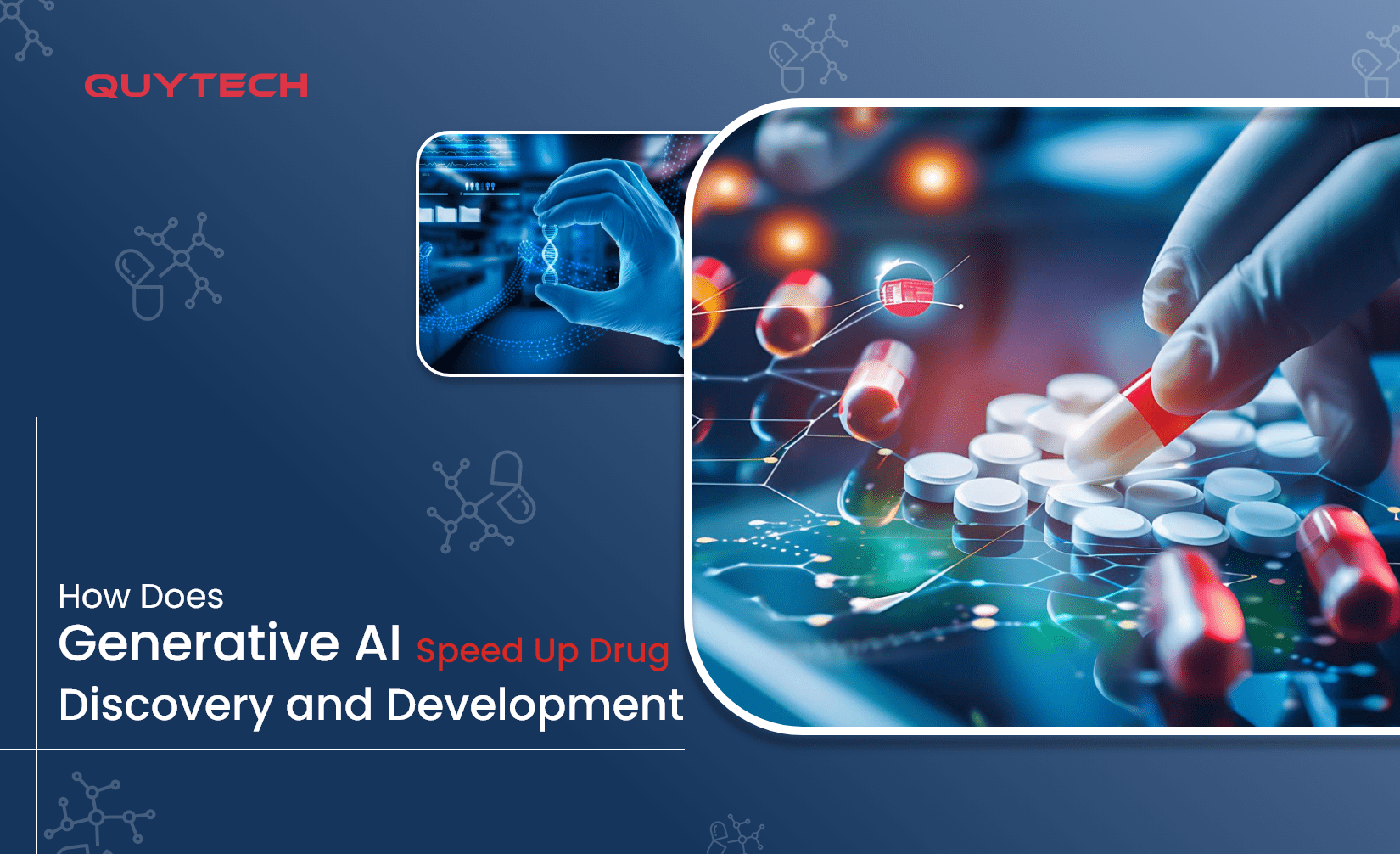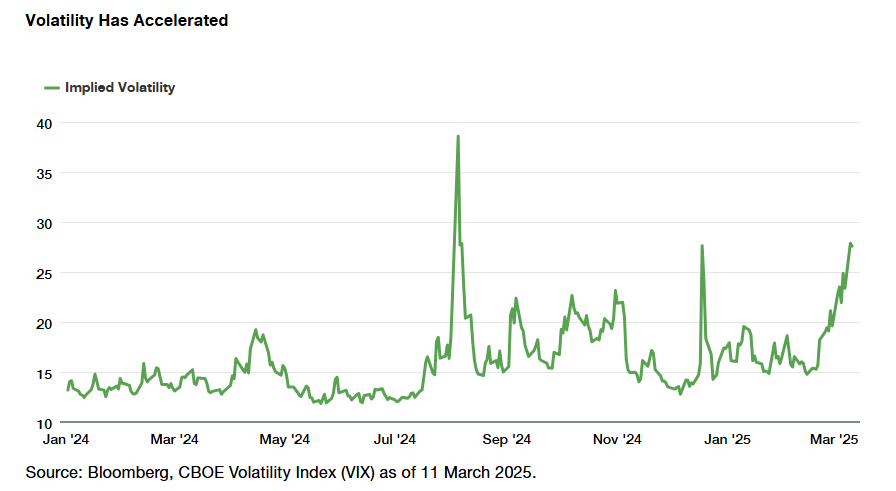The pharmaceutical industry is growing at an unprecedented rate; thanks to the increasing adoption of emerging technologies such as generative AI. While most people still see generative AI as a technology that comprehends and generates human language, its potential is far beyond.
Among all use cases of generative AI in pharmaceuticals, this blog highlights how this popular and widely used subset of artificial intelligence accelerates drug development and discovery. Let’s quickly begin!
A Brief About Drug Discovery and Development
Drug development and discovery is a time-intensive and complex process. It involves studying critical elements, such as DNAs, proteins, and chemicals of a body to identify, research, and develop medications to treat and prevent diseases. Generative AI has a multimodel nature that is created using languages, images, patient info, and various other structured and unstructured data.
The technology could offer more to pharmaceutical companies, provided they know how to utilize its potential for accelerating processes and addressing challenges. A study by McKinsey highlights that the technology might generate up to $110 billion a year in economic value for the organizations involved in the discovery and development of drugs.
The Role of Generative AI in Accelerating Drug Discovery and Development
Now that you know enough about Generative AI and the significance of drug discovery and development in pharmaceuticals, let’s check out how this technology speeds up this process.

- Extracting and Analyzing Scientific Data
Drug researchers spend considerable time capturing clinical trials’ and patients’ data and scientific journals required to comprehend disease and drug targets. On one side, it is time-consuming; on the other side, it doesn’t guarantee providing complete and accurate information due to the involvement of enormous amounts of data.
Generative AI-powered systems or software can speed up this process by seamlessly capturing and assessing structured and unstructured data from myriad sources and in all forms, including texts and images. It can minimize the burden on researchers. The latest generative AI tools can deeply understand the context and intent of data to enable drug scientists to utilize the analyzed data for drug discovery and development.
- Chemical Compounds Screening
The inability to identify and prioritize in silico compounds can be a roadblock to drug development with a higher probability of treating a specific illness and, thus, deserve to be directly sent to labs for testing.
With generative AI, researchers can expedite this screening process by leveraging advanced models that can assess chemical compounds by their structure and purpose. These models are like GPT-4, which can understand the intent of the text to predict the next word of the sentence.
The foundational chemistry models powered by gen AI can suggest the next part of the chemical structure or compound. The insights derived can be further used to train machine learning models to provide more accurate predictions even in the less explored areas of chemistry.
- Refining Large Molecules
Gen AI-powered tools can aid researchers in predicting the potential of micro-chemical compounds for treating various illnesses. Doing the same manually, especially in the case of complex molecules like mRNA and antibodies, seems next to impossible.
These chemical compounds and molecules are required to be evaluated for designing targeted therapies and improving vaccines; however, their complex nature leads to a spike in the drug development cost and discovery time.
Utilizing generative AI and LLMs can help researchers anticipate the next substructure of these molecules and extract critical information associated with complex molecules’ structure and chemistry. This information can further help in designing novel drug vectors and determining the efficacy of different drugs.
- Enhancing Trials and Portfolios Optimization
Clinical trials are a significant part of drug discovery and development. However, it is challenging to identify the right patients to do clinical trials on. That’s because some participants may not respond as expected to the treatment of a potential problem during the trial. It can slow down the entire drug development process.
Generative AI can help research companies or organizations find the right fit for clinical trials. In fact, using generative AI-powered models can efficiently and quickly assess genetic and phenotypic data that can help professionals understand why patients from multiple subgroups respond differently to the same treatment.
The technology can even help scientists pinpoint totally new biomarkers by automatically capturing and analyzing data collected from CT scans, MRIs, and other medical imaging methods. Based on these biomarkers, they can discover early signs of several diseases and can develop medicines for their successful prevention.
- Clinical Trial Performance Optimizer
Gen AI can act as an assistant to optimize and evaluate clinical trial performance and efficiency. It can analyze large datasets and share insights as well as suggest ways to improve the precision of clinical trials.
Many companies involved in drug development and discovery have already built “clinical control towers” that are next-level analytics platforms facilitating data-backed decision-making to accelerate the pace of clinical trials.
The gen AI assistants working particularly to optimize clinical trials empower researchers with conversational AI to offer customized and actionable insights in an easy-to-understand format, smart alerts to allow various research teams to adopt a proactive approach for early interventions, and seamless communication and collaboration across departments.
- Efficient Data Management
Manual data management requires huge resources and doesn’t guarantee accuracy and efficiency. However, merging conventional ways with generative AI can facilitate efficient data management by integrating automation in database creation, case report forms generation, and patient profiles and visit type evaluation.
- Creating Regulatory Intelligence Engines
For successful clinical trials, pharmaceutical organizations have to answer all HAQs (Health Authority Queries of the regulatory bodies. Any disruption or delay in the process can directly impact the approval process or time-to-market.
Creating generative AI-powered regulatory intelligence engines can be a boon in this. Such an engine can predict potential query patterns for a particular type of trial and help design the answers to those queries.
- Writing Submissions
Writing submissions is essential for successful regulatory review. Gen AI can be your submission writer who can quickly and accurately draft clinical study reports in no time. Doing the same manually might take up to ten weeks.
It relieves medical writers from the hassle of writing a dossier with highly complicated clinical interpretation. It also enables you to accelerate the drug launch times.
- Expedite Inventory Procurement
Building a Gen AI chatbot or agent can streamline the procurement process to save time and enhance efficiency. It can automatically research market conditions, get supplier information, and other details to generate RFPs, invoices, and responses to speed up the process of obtaining materials required for drug development and discovery.
- Real-time Inventory Management
Shortage of inventory may impact the drug development or production time. Generative AI tools can address this challenge by analyzing market trends to predict increasing demand, identify bottlenecks that obstruct inventory management, and suggest preventive measures to avoid both stock-outs and overstocking to verify optimum levels of inventory.
- Virtual Assistants for Drug Manufacturing
Developing a gen AI-enabled virtual assistant can optimize drug manufacturing. It can locate standard operating procedures and automate the generation of standards, guidelines, and checklists for repetitive tasks associated with drug development. A virtual assistant can even monitor and manage line performance while suggesting predictive maintenance to avoid shutdowns.
You might also want to read: The Role of Generative AI in Enhancing Clinical Documentation
Benefits of Generative AI in Drug Development and Discovery
Utilizing generative AI in drug discovery and development renders immense advantages; some of which are as follows:
Accelerating Drug Discovery
The generative AI technology speeds up the drug discovery process by interpreting the DNA language, alphabets (consisting of over 20 amino acids) of proteins, promising molecules, and the structure of various chemicals. This process otherwise requires intense human effort and a considerable amount of time.
Improving Prediction of Drug Properties
Generative AI-powered algorithms can predict different properties, like solubility, toxicity, and more, of drugs by auto-analyzing their structure. It helps in defining the drug’s use case.
Personalizing Treatment Plans
Gen AI can derive crucial insights and patterns from collected patient data. These insights can further help with designing a personalized treatment plan that effectively treats each patient’s health problems.
Enhancing Productivity
Implementing generative AI automates complex and time-intensive jobs, such as document creation and record management. It boosts drug researchers’ productivity and enables them to work on other critical operations.
Identifying New Drug Targets
Generative AI can analyze patients’ biological data to discover new targets for developing a particular drug, making it possible to create new treatments and expand therapeutic possibilities.
Optimized Clinical Trials
This subset of artificial intelligence can also assist with optimizing clinical trials by identifying the population for which a particular drug will work or is suitable. The technology can also predict outcomes of clinical trials, which saves time and resources.
Reduced Development Costs
By streamlining the drug development process, generative AI minimizes the overall cost of developing and bringing new drugs to market.
How to Use Generative AI for Expediting Drug Discovery and Development?
Generative AI poses a promising future in the pharmaceutical sector by changing the way data is being used and processed for drug discovery and development. It also transforms other stages associated with both these areas to expedite the entire process without compromising precision and efficiency.
To implement this technology for accelerating drug development and discovery, you need to connect with a generative AI development company with prior experience in catering to the pharmaceutical sector. They would better understand your requirements and develop a solution that can address challenges associated with drug development and discovery. Besides verifying the background, ensure the company adheres to industry standards and prioritizes data security and customization.
While each generative AI development service provider has their unique process for developing a gen AI-enabled solution for the pharmaceutical, the general development process might look something like this:
- Data acquisition and preparation: Involves data collection, cleaning, and preprocessing to extract meaningful insights.
- Model development and training: Includes selecting the right Gen AI algorithm, designing the architecture of the model, and training it on a given dataset.
- Drug candidate generation: Encompasses generating new molecular structures, designing molecules, and improving existing drug candidates.
- Virtual screening and prediction: It’s about identifying potential drug targets, assessing generated molecules, and predicting the properties of molecules.
- Experimental validation: Involves synthesis and testing of potential drug targets, refining AI models, generating new targets, and advancing successful candidates.
Explore Generative AI’s potential in Interior Design.
Conclusion
Generative AI can bring a transformative change into drug discovery and development. This technology can disrupt this aspect of the pharmaceutical sector to speed up drug development, automate time-consuming critical operations, and extract useful insights from structured and unstructured data to change the face of medicine development and discovery.
The only thing medical professionals or research institutions have to do is partner with a reputed and experienced generative AI development company that can identify the best use case of this technology and implement it with the least disruption to revolutionize drug development and discovery.




















Discussion about this post